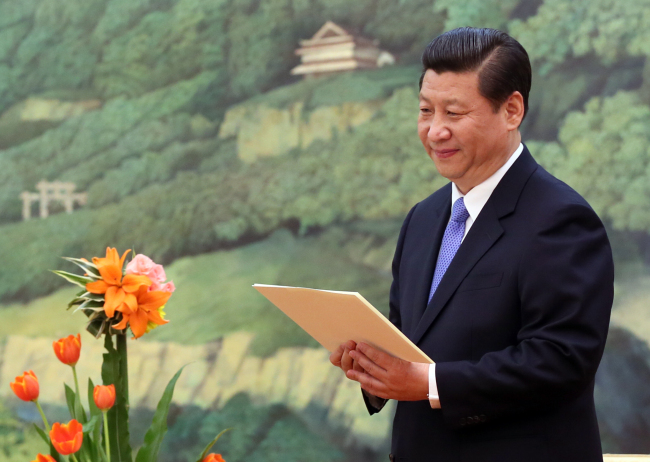 |
중국 시진핑 총서기가 23일 오후 중국 베이징 인민대회당 복건청에서 김무성 특사로부터 박근혜 대통령 당선인의 친서를 전달받고 있다. (연합뉴스) |
<관련 영문 기사>
N.K. nuclear threats put Beijing to test
By Shin Hyon-hee
As North Korea’s third nuclear test looms large, China is coming under all too familiar pressure to convince its unruly ally to change course or lend impetus to the next batch of international sanctions.
Beijing has for decades been propping up Pyongyang by supplying food, fuel and other necessities and providing political backing in the face of its provocations.
With stability being its top priority in the region, China’s patronage has also helped it exert greater clout over its reclusive neighbor and on the world stage.
South Korea, the U.S. and other countries are calling for China’s extra efforts to discourage the North from the high-stake plan. The allies have vowed additional, more stifling measures such as targeting its financial assets or sea transport, should the communist state detonate another fission bomb.
Lim Sung-nam, Seoul’s special representative for Korean Peninsula peace and security affairs, met with his Chinese counterpart, Wu Dawei, and other executives in Beijing on Tuesday.
“The Chinese don’t like the fact that the North Koreans continue with these provocations, which everyone blames China for not stopping,” Victor Cha, director of Asian studies at Georgetown University and a North Korea expert at the Center for Strategic and International Studies, told the Council on Foreign Relations.
“The Chinese don’t want to cut off (assistance), because that might create instability, and they don’t want to see the collapse of North Korea.”
Though China has downplayed its influence in the regime’s behavior, its role is taking on added significance after the U.N. Security Council approved stronger-than-expected sanctions in punishment for the North’s December rocket liftoff.
Beijing’s endorsement of Resolution 2087 marks a shift away from its normally rigid resistance to any compulsory action against its ally. But the decision caused a rift between the two allies, with the North blasting China for “abandoning without hesitation even elementary principles.”
China, for its part, has reportedly called in North Korean Ambassador Ji Jae-ryong “several times” since the regime on Jan. 24 threatened to carry out more firings of long-range rockets and a “high-level nuclear test aimed at the U.S.”
Its state-run Global Times last week hinted at slashing assistance in response to another atomic explosion.
China’s president-in-waiting Xi Jinping also expressed his resistance to the regime’s development of its nuclear programs and other weapons of mass destruction at his meeting late last month with Park’s special envoys led by Kim Moo-sung.
Nonetheless, signs are growing that the communist country is counting down to a third detonation of a nuclear device. Seoul’s Defense Ministry and intelligence see the North as technically ready and simply waiting for the political go-ahead.
Satellite images point to final preparations at the North’s Punggye test site, with tunnels, radioactivity detecting devices and other relevant equipment installed at its western and southern parts. A cover has also been placed at the entrance of the site to fend off satellite monitoring by other countries.
North Korea said Sunday its leader Kim Jong-un has made an “important decision that serves as a guideline to further strengthen the military” and “protect national security and sovereignty,”
On Jan. 27, the KCNA reported that Kim “expressed the firm resolution to take substantial and high-profile important state measures” against the latest sanctions. Rodong Sinmun, the North’s main party newspaper, said the same day that the country now has “no other option,” saying “a nuclear test is what the people demand.”
(heeshin@heraldcorp.com)







![[Today’s K-pop] Blackpink’s Jennie, Lisa invited to Coachella as solo acts](http://res.heraldm.com/phpwas/restmb_idxmake.php?idx=644&simg=/content/image/2024/11/21/20241121050099_0.jpg)